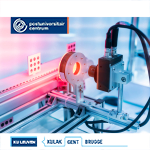A Taste of the Future: How Barry Callebaut implements AI in their production process and why you should too
25/04/2023
Barry Callebaut, the world’s largest chocolate producer, is one of the nine companies that won a Factory of the Future award this year. This calls for an interview with Yves Demeersman, Data Engineering & AI Lead at the company and participant of the postgraduate programme Artificial Intelligence in Business and Industry. He takes us through the reasons why Barry Callebaut is so committed to this innovation.
From milk powder to machine settings: The impact of AI on quality control
About three years ago, Barry Callebaut launched its first AI pilot project. Yves Demeersman, Data Engineering & AI Lead at Barry Callebaut, explains: "The production processes at Barry Callebaut are naturally very complex due to the nature of the raw materials. Milk powder, for example, can vary in consistency from day to day, which can have an impact on the machine settings needed for a good final quality."
In addition, thanks to a successful digital transformation, Barry Callebaut currently possesses a large quantity of production data. This data is used to gain more insight into the process and to develop an AI assistant for their operators. "We are currently in the final stages of testing the assistant before making it available for the operator," says Yves.
From Factory of the Future to AI-driven innovations
According to Yves the usefulness of AI has been proven yet again, thanks to the Factory of the Future award. "I think everyone within Barry Callebaut is convinced that artificial intelligence is and will remain an important aspect in industries. Therefore, we are going to rely increasingly on AI to improve the quality of our products, improve service to customers and make more efficient use of raw materials and energy in the upcoming years. This translates to commitments in terms of innovation, research, implementation and personnel."
Personnel is a particularly important pillar in this respect. "Barry Callebaut is known as a company that supports its employees in lifelong learning, one of the reasons we won the Factory of the Future award. I had already taken several high-level online courses but was still hungry for more. When I discovered the postgraduate programme Artificial Intelligence in Business and Industry, I did not hesitate to enrol," Yves adds.
The Complete Guide to AI: Theory and Practice
The programme consists of two parts. The first part focuses on broad, theoretical, and mathematical knowledge on topics such as 'machine learning', 'artificial neural networks', and 'fundamentals of AI'. "You learn how certain AI architectures work, but also how to think critically about the pros and cons of different techniques," Yves says.
The second part of the course covers more useful and advanced AI techniques such as computer vision and NLP. You learn how to deliver an AI project from start to finish. Yves adds: “You often learn how to solve a use case with programme A and library B, but during the postgraduate programme, you learn fundamental knowledge in order to work with any programme and any library. You learn things that are directly applicable in a business context."

Yves Demeersman, Data Engineering & AI Lead at Barry Callebaut
Want to know more about the postgraduate programme AI in Business and Industry?
The postgraduate programme on AI in Business and Industry gives engineers, computer scientists and other professionals the opportunity to specialise in the field of AI.
Interested? Read more about the programme or contact programme coordinator Benedicte Seynhaeve.
Critical Thinking in AI
Yves will soon be able to apply the insights from the classes to his job, he says. "I learned to think more critically about the platforms we are offered. At Barry Callebaut we often have meetings with companies that claim to have found the solution for our business. Thanks to the programme, I was given the tools and knowledge to filter out what is actually helpful."
"Another takeaway was learning how to judge AI models," Yves continues. "At Barry Callebaut, we often say that it is easy to create a model, but it is difficult to then define the next steps. When is a model good enough? When do you move to the testing phase? How do we ensure that the predictions of each model remain accurate?"
During the courses, there is always room to ask questions about the content of the lesson, and how this translates to our professional experience. "It is of course interesting to talk to the lecturers and my fellow students, to share our experiences with AI and the progress we are making. I see this course as a type of networking event as well where you can build relationships with people who have similar interests," adds Yves.
How AI can play an important role in your field and organisation
Are you interested in learning how Artificial Intelligence can make a difference for your organization? Be sure to explore our training programmes!






